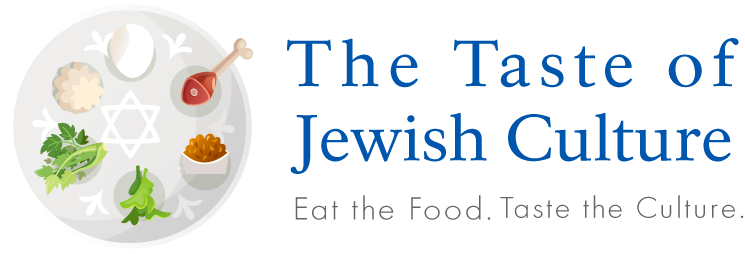Jewish Food Talks
 I regularly travel to lecture in a variety of venues. I’ve spoken in synagogues of many varieties (Orthodox, Reform, Conservative, Chabad), for JCCs and Federations, to student and senior groups, at various conferences, and even at private events. To date, my Jewish Food Talks have brought me to numerous cities across seven countries on four continents, as well as to worldwide audiences via online sessions. I have an ongoing schedule of lecture tours, traveling to different countries multiple times a year.
I regularly travel to lecture in a variety of venues. I’ve spoken in synagogues of many varieties (Orthodox, Reform, Conservative, Chabad), for JCCs and Federations, to student and senior groups, at various conferences, and even at private events. To date, my Jewish Food Talks have brought me to numerous cities across seven countries on four continents, as well as to worldwide audiences via online sessions. I have an ongoing schedule of lecture tours, traveling to different countries multiple times a year.
Below, you will find my current topic offerings, though I am always developing more options. Some of the video excerpts were from online programs, and others were from in-person events. All talks are available for either option. If you are interested in having me speak to your group or organization, please be in touch!
Lecture Topics and Descriptions
New Topic: Bearing Arms or Breaking Bread? Food in the Arab-Israeli Conflict
What can we learn about the Arab-Israeli conflict if we view it through the lens of food? From Jaffa oranges, to the “hummus wars,” to today’s most popular street foods, this talk explores the historical weaponization of food, but also the foods that provide hope for our future. In the shadow of October 7, what does Israel’s cuisine say about where its society is heading?
This excerpt looks at the Jaffa Orange in all its complexity, both as an agricultural product, and as a symbol.
Chulent and Hamin: The Stew With 1000 Flavors
Wherever Jews have spread throughout our complex and storied history, we’ve carried a simple Shabbat stew with us, adapting it to the local ingredients and tastes. A culinary history of this most Jewish of dishes that will whet your appetite, but not sit heavily in your stomach.
Here is the intro to this lecture, presented via Zoom to the Limmud North America eFestival on March 29, 2020:
Chulent: The Next Generation. What’s New with the Shabbat Stew?
Though the Shabbat stew has been around for thousands of years, and traveled with the Jews wherever they moved, more changes have taken place to this beloved dish in contemporary times than ever before. It is no longer for Shabbat alone, only eaten by the observant, nor even just for Jews! With the many unique trends affecting the dish today, it has boldly gone where no Shabbat stew has gone before.
(Note: This program can stand alone, or be paired with the previous talk about the stews from around the world.)
Jews Who Drink: The Surprising and Intimate Story of Jews and Booze
Common wisdom states that Jews don’t drink. But while it may not be the Jewish vice of choice, all evidence indicates the common wisdom to be wrong. From Biblical times, through 9th century Iraq and 18th century Poland, into the modern State of Israel, this talk reveals the fascinating history of Jews and their drinking habit.
This clip combines a few excerpts from the beginning of this talk, presented via Zoom to Mount Sinai Jewish Center in New York City on May 21, 2020:
The Original Culinary Movers and Shakers: Jews as Transporters of Food
From oranges to chocolate, wine to sugar, most foods today have spread beyond their birthplaces. How did they get from place to place, when, and who brought them? From ancient times until modernity, Jews have been disproportionately involved in transporting ingredients and dishes from place to place. This talk tells the surprising stories of the wandering Jew’s gastronomic impact, and the reasons that underlie our role in culinary history.
Here I show how Jews’ involvement in the international spice trade passed down from generation to generation, setting a pattern that got repeated many more times with other goods. (from Toronto’s Schwartz/Reisman Centre, Nov. 9, 2023.
A Land of Milk and Mufletta: At the Crossroads of Israel’s Cuisine and Culture
Israeli chefs have recently conquered the culinary world, but what about all those foods they left behind at home? What do these dishes say about Israel itself? From falafel to petitim, meurav Yerushalmi to mufleta, I will reveal the culture behind the distinctive foods that make Israel so deliciously… Israeli.
In this video, I speak about the rise of non-Ashkenazi cuisine in Israel during the 1970s:
And here I explore the interesting history of the fruit that also describes a native-born Israeli, the sabra:
They Tried to Kill Us, We Won, Let’s Eat! Jewish Food Conquers Antisemitism
Jewish Food reflects our cultural and experiences, and unfortunately ansemitism has been a constant challenge for us. Despite that, however, we have triumphed time and again, persevering while our enemies have disappeared to history. And our foods reflect that as well. Jewish Food has served as a coping mechanism, and at times formed the literal means of how we have conquered and overcome those who have tried to defeat us.
What is a Jewish Food? An Exploration (with Tastings) for Youth
What makes a food Jewish? Are there any foods that are Jewish without a doubt? Do we ask these same questions about other people’s cuisines? And most importantly, why does it matter what foods are or are not Jewish? We’ll taste a number of foods, and use them to find the answers to these questions, and more.
A video of a related talk I did for adults, this Ted-style talk explores (in 18 minutes) “What Makes a Food Jewish?” (via FED, Nov. 1, 2023):
The Jewish Culinary Calendar:
Not Just Apples and Honey: Rosh Hashana Foods and Their Many Meanings
We all know that we have to “dip the apple in the honey” on Rosh Hashana. But there are so many more symbolic foods that Jews around the world eat on the holiday. What do all of these foods mean? Why is symbolism such a big part of this holiday? How legit are “new simanim” at the Rosh Hashana table? And most importantly, what do these traditions say about our people?
Oil, Almonds, and… Ears?! The Customary Foods of Chanukkah, Tu B’Shvat, and Purim
These three holidays all have popular foods associated with them, and plenty more that may be less familiar. By diving deeper into the dishes we eat to celebrate, we’ll answer such perplexing questions as, “would we still eat latkes if there were no miracle of the oil,” “what the heck is bokser anyway,” and “did Haman actually have pointy ears?”
Crackers, Crepes, and Cheese: Jewish Culinary Traditions From Passover to Shavuot
As our most food-connected holiday, Passover features symbolic foods with clear – yet sometimes curious – meanings. On Shavuot, conversely, the most widespread gastronomic custom grows out of mysterious origins. Add in the peculiar traditions of the Mimouna holiday that comes at the end of Passover, and we have a host of culinary questions to answer. This talk addresses them all, and reveals the Jewish values at play in these festival foods.
Other topics in development (can be fast-tracked if requested):
- Jewish Wisdom from the Frugal Kitchen
- The History of American Jewish Cuisine
- Jewish Food and Jewish Values
- The Diversity of Jewish Food Culture
Feel free to approach me about other potential topics as well!


